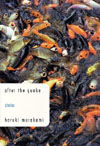
Comment
on this story
|
 |

Alienation and the modern writer in after the quake
by Jonathan Frey
In an early novel, Japanese writer Haruki Murakami's narrator remarks, "sex is an extremely subtle undertaking, unlike going to the department store on Sunday to buy a thermos." It would be difficult to imagine quite such playfulness appearing in after the quake (Knopf, $21), Murakami's latest collection of short stories.
Not that other of Murakami's well-known and singular traits are missing, i.e., his penchant for Western cultural references over Japanese models, the unique individualism of his protagonists, oddly supernatural occurrences, intimate descriptions of food and its preparation. These and an irreverent coolness, notably absent in the present collection, are what made reading Murakami's novel  Hard-boiled Wonderland and the End of the World, from which the above quotation is taken, such an extraordinary and mind-blowing experience. Hard-boiled Wonderland and the End of the World, from which the above quotation is taken, such an extraordinary and mind-blowing experience.
After the quake represents the more sober Murakami, perhaps best described in this post-everything epoch as now being in his post-Japanese economic bubble, post-earthquake, and post-sarin gas attack period. The title of this collection refers to the Jan. 17, 1995 earthquake centered on Kobe, Japan, that resulted in 5,500 deaths, 300,000 homeless, and perhaps the largest natural-disaster-caused economic loss in modern times. And indeed, the catastrophe is mentioned in each of these stories, most of which are set the month after the quake hit. However, no story is set in Kobe itself nor is the quake itself a depicted detail, but rather a recognized force of change, a universally shared moment, an emotional Greenwich Mean Time.
In the first story, "ufo in kushiro," a Tokyo man's wife becomes obsessed with the televised coverage of Kobe following the disaster, glued to the TV for days even though she has no family or friends there, and then suddenly leaves her husband to return to her parents in a northern city. In "landscape with flatiron," the ex-wife and children of an alienated painter cum beach bonfire builder live in Kobe although he doesn't know how they have fared and doesn't appear particularly interested in finding out. A woman taking a few days vacation following a business trip, in the story "thailand," ruminates over the fact that her second husband has recently left her because she cannot have children and hopes her first husband—apparently responsible for her present infertility—has died in the Kobe quake. In each, Kobe is a recurring thread, an event to which the protagonists relate, never present enough to be more than a referent, but throughout the collection becoming a character itself, a supporting cast member.
But this commonalty aside, a more profound association these stories share is their characters' disaffection for themselves. The Tokyo man, following his wife's departure, decides to travel north for a week off to recover, only to learn that "[n]o matter how far you travel, you can never get away from yourself. It's like your shadow. It follows you everywhere." A girl who has run away from home in Tokyo, meets up with the bonfire-building painter and confesses that she is "completely empty, cleaned out." His flippant retort is classic pre-post-period Murakami: "Get a good night's sleep. That usually fixes it." But this being post-period Murakami, the artist quickly concedes, "It may not be that easy." In "super-frog saves tokyo," a bank collections officer encounters a talking, tea-preparing, Dostoevsky-citing frog who solicits his support in saving Tokyo from an upcoming earthquake. In the end, the possibly imaginative figment of a frog reveals, "My enemy is, among other things, the me inside me."
Murakami's characters tend toward alienation, in early works often affecting a protective glibness, accentuated by an unusual (for Japanese fiction) and unexpected Western cultural sophistication. Here, too, people surprisingly often listen to Pearl Jam, whistle Schubert, drink single malt, prepare spaghetti, acquire degrees in English Literature, and read John Updike, rarely referring to Japanese cognates, all in an otherwise thoroughly Japanese setting (only the story "thailand" is set outside Japan). But the aloofness is gone or greatly mitigated, and the players are engaged, exploring their alienation, explicitly recognizing an "an entirely new sense of isolation," or as the short story writer in "Honey Pie" states: "I have no roots; I'm not connected to anything."
In the '90s, the U.S. was too busy making money to be aware of fin de siècle sensations of rootlessness, moreover providing Murakami no appropriate Western event to tie these stories together. Whether Murakami will continue to explore these themes in Japanese context is anyone's guess; that his stories now provide analogs for us, in our now uniquely American post-obsessed era, is without doubt.

February 13, 2003 * Vol. 13, No. 7
© 2003 Metro Pulse
|